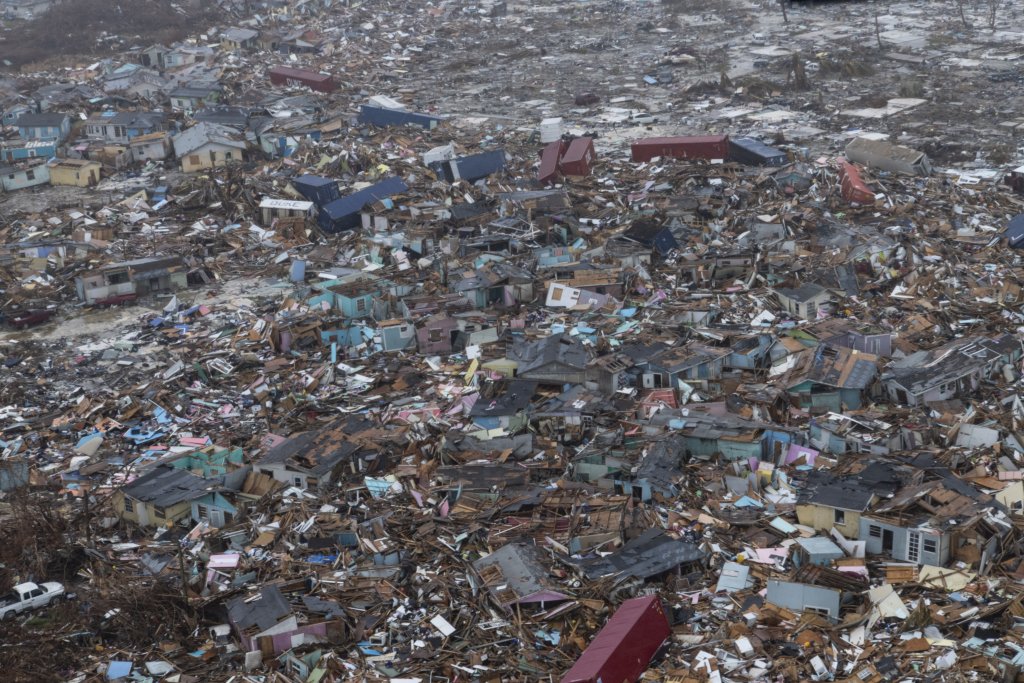The following piece has been contributed by Kristoff Ayala-Strachan, a young Anglican who lives in Grand Bahama. In 2019, Kristoff and his family lived through Hurricane Dorian as it tore through the Bahamas. Here, Kristoff describes that experience, reflects on the implications increasing storms will have on people’s ability to raise families in The Bahamas and speaks about the need for the Church to act to combat climate change. The piece was written a few weeks after the hurricane.

Kristoff Ayala-Strachan
Living through Dorian – a “freight train” of a hurricane
The first hurricane I experienced was Hurricane Floyd in 1999. While it may not have such a bad reputation as Hurricane Dorian, for the people of Abaco & Grand Bahama, Floyd and its path across the two islands leaves many with less than comfortable memories. Since, then, I’ve gone on to experience 7 other hurricanes, including Dorian.
Thus I and many other Bahamians were no strangers to hurricanes as we prepared for Hurricane Dorian. Having experienced so many hurricanes before, while taking the threat that Dorian brought very seriously, I still imagined that though there would be damage, things would be back to normal soon.
Naturally, my family and I prepared by stocking up on food, water and other supplies such as batteries, candles, flashlights and materials to safeguard our actual home. However, there was nothing really that could have prepared anyone for what we actually went through.
Hurricane Dorian rushed through the islands of Abaco & Grand Bahama like a freight train. I remember watching weather bulletins and seeing that the hurricane continued to strengthen as it moved closer and closer to The Northern Bahamas and feeling as if I was being punched in the gut. As Dorian crept across Abaco and images & videos of the damage being wrought there began circulating, I became so nervous, thinking that I needed to expect the same. I wasn’t far off.

The devastation of Marsh Harbour, Abaco caused by Hurricane Dorian. UN photo/OCHA/Mark Garten.
Throughout the entire ordeal, for almost three days, I wondered when it would be my time to leave, like thousands of other people who had to leave their homes when they became compromised. Fortunately, this was not the case for me and my family in our home. However, my grandmother was not as fortunate, and she had to leave her home in the middle of the worst of Hurricane Dorian when several feet of water from the ocean inundated her neighbourhood. We wouldn’t be able to get to her for several days after Dorian passed and this was also the case for the other family members who lived in severely impacted areas. Flood waters took days to recede and the roads that remained dry were impassable due to fallen trees, lamp poles or even building materials from buildings that were damaged or destroyed.
For the people of Abaco & Grand Bahama, while no strangers to hurricanes – having been impacted by them more than any of the other islands in The Bahamas and even the wider Caribbean region entirely – the process to normalcy will be slow given the level of utter destruction. Many businesses throughout the two islands remain closed and owners are uncertain as to when or if they will reopen. Both airports operate at limited capacities and many of people from both islands have left entirely having lost everything they’ve owned. Or, if they haven’t lost anything or as much as their neighbours, the trauma of living through the worst hurricane of thousands of people’s lifetimes is too much to bear.
The wider context
The Bahamas, like most countries in the Caribbean, is susceptible to hurricanes. On average, The Bahamas has been hit by a hurricane every two years and by a major hurricane every four years. But over the past ten years, The Bahamas has been hit by a hurricane almost consecutively every year. This change is believed to be a result of global climate change, which is also resulting in rising sea levels.
Together, intense tropical cyclones and rising sea levels wreak havoc and leave families distraught and fractured in a myriad of ways. Very often, families – regardless of their composition or social class – lose all of their physical possessions. All physical mementos of the memories and lives that they have created with the people that they loved are lost within a moment. Financially, these storms continue to be an immense burden. Many persons have to undertake the cost of replacing valuables like cars, repairing their homes and even completely rebuilding them. With rising sea levels a constant threat, many persons opt to leave the place of their homes for decades in favour of an area believed to be safer or perhaps even another island.
Fortunately, this is not the story for everyone in the Caribbean. For those in the Dutch ABC Islands or Trinidad & Tobago rarely hit by tropical cyclones, they need not to worry about the destruction that could be done. However, the remaining of the Lesser Antilles & Greater Antilles lay like prey waiting to be hunted. All of the residents of these islands wait in fear from June 1st to November 30th during hurricane season, as these storms affect everyone in its path regardless of race, religion, sex or socioeconomic status. In a matter of hours, anyone can be left with absolutely nothing.
What does the future hold?
Climate change at this point seems irreversible. However, there are myriad ways that its effects can be mitigated. I imagine that, frankly speaking, my children will grow up in country and region very different from where I grew up, if it is even safe for them to do so. I say that because, if we do not work arduously to slow down the effects of climate change, hurricanes will be more frequent and even stronger than what we experience now and in a country like The Bahamas that already experiences so many storms, it may simply prove to be unsafe to raise a family. This thought is one that saddens me, but one that I may have to become comfortable with as it may be my reality and the reality for millions of other people around the world who live in island states and are impacted by tropical storms.
What role has the Church played and what would you like it to be saying about climate change?
The Church has played an interesting role in The Bahamas as it relates to hurricane preparation and relief efforts. Throughout each island, the overwhelming majority of designated hurricane shelters are churches, irrespective of denomination fulfilling its purpose of not only being a place of spiritual refuge and salvation, but also physical. In the case of Hurricane Dorian, churches like the Anglican Pro-Cathedral of Christ the King and the Anglican Church of the Ascension became centres of food and clothing distribution despite, in the case of Christ the King, also sustaining damage from the hurricane.
I do believe that the Church should be more vocal about the damage that climate change is causing throughout the entire earth. Christianity, all of its denominations, attracts the most followers throughout the world. Over a billion people, collectively, believe that the earth and everything therein was created by God. Thus, the earth and all of its lifeforms should be treated as gifts from God themselves and to destroy, purposely, should be treated as an act of ungratefulness towards God, the creator of heaven and earth. It should be the duty of mankind to maintain the earth in a state that is pleasing to God and the Church should be at the forefront of conversations about climate change and mitigating it. While the church is present in the aftermath of natural disasters as it relates to relief efforts, the church should also be present trying to prevent many of the disasters from being as detrimental to human life as they are becoming due to the effects of climate change.
